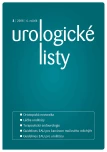-
Medical journals
- Career
Combination treatment of BPH - an update
Authors: MUDr. Azat Chamzin, CSc.
Authors‘ workplace: Jihlavská 20, 625 00 Brno akhamzin@fnbrno. cz ; Urologická klinika FN Brno
Published in: Urol List 2008; 6(3): 55-58
Overview
There is trend in population aging and according to statistics there is estimate that in 2050 15% of population will be 65 years old and older. When men reach that age almost everyone will have histological signs of benign prostatic hyperplasia and approximately 50% of them lower urinary tract symptoms accompanying enlargement of the prostatic gland. In the last 18 years, thanks to new possibilities of medicamentous treatment, we face significant decline of BPH surgeries. We have today available not only effective monotherapies but also combination treatment of BPH. In the article are presented current therapeutic possibilities and results of combination treatment of BPH.
Key words:
benign prostatic hyperplasia, lower urinary tract symptoms ,combination treatment, alpha blockers, 5 alpha reductase inhibitors, phytotherapy, anticholinergics
Sources
1. Health Care Finans. Administration: B.E.S.S. Data. Washington, DC 2000.
2. Roehrborn CG, McConnel JD. Etiology, Pathophysiology, Epidemiology, and Natural History of Benign Prostatic Hyperplasia. Chapter 38 In: Campbell's Urology 8. ed. WB Sauders 2002.
3. Marberger M, Harkaway R, de la Rosette J. Optimizing the medical management of benign prostatic hyperplasia. Eur Urol 2004; 45 : 411–419.
4. Djavan B, Chapple C, Milani S, Marberger M. State of the art on the efficacy and tolerability of alpha 1-adrenoreceptor antagonists in patients with lower urinary tract symptoms suggestive of benign prostatic hyperplasia. Urology 2004; 64 : 1081–1088.
5. Djavan B, Marberger M. A meta-analysis on the efficacy and tolerability of alpha 1-adrenoreceptor antagonists in patients with lower urinary tract symptoms suggestive of benign prostatic hyperplasia. Eur Urol 1999; 36 : 1-13.
6. Suchopár J. Finasterid. Remedia 1993; 4 : 227.
7. Pavlík I. Dobrý den, tady finasterid. Urologie pro praxi 2000 : 1
8. Stoner E. Study group. The clinical effect of 5 alfa reductase inhibitor, finasterid, on benign prostatic hyperplasia. J Urol 1992; 147 : 1298–1302. 2000; 1(1): 39.
9. Debruyne F, Barkin J, van Erps P et al. Efficacy and safety of long-term treatment with dual 5 alpha-reductase inhibitor dutasteride in men with symptomatic benign prostatic hyperplasia. Eur Urol 2004; 46 : 488–495.
10. Pushkar D, Kosko J, Loran O. A trial of the use of finasteride and terazosin in patients with benign prostate hyperplasia. Urol Nefrol 1995; 4 : 32–35.
11. McConnell JD, Roehrborn CG, Bautista OM et al. The Long-term effect of doxazosin, finasteride and combination therapy on the clinical progression of BPH. N Engl J Med 2003; 349 : 2385–2396.
12. McConnell JD, Roehrborn CG, Bautista OM, Andriole GL Jr ed. The long-term effect of doxazosin, finasteride, and combination therapy on the clinical progression of benign prostatic hyperplasia. J Urol, 2006 Jan; 175 (1): 217–220.
13. Pushkar D, Kosko J, Loran O. A peak flow and IPSS changes in patients treated with a combination of finasteride and terazosin after withdrawing terazosin. Br J Urol 1997; 80 (Suppl): 208.
14. Kaplan SA, Slawin KM, Te AE. Benign prostatic hyperplasia: New diagnostic and treatment paradigm, AUA annual meeting, San Antonio 2005.
15. Verner P. Benigní hyperplazie prostaty, současný přístup k farmakologické léčbě. Edice Farmakoterapie pro praxi, sv. 6, Jessenius Maxdorf 2005.
16. Lee JY et al. Comparison of doxazosin with or without tolterodine in men with symptomatic bladder outlet obstruction and an overactive bladder. BJU Int 2004; 94(6): 817–820.
17. Verner p. et al. Medikamentózní léčba benigní hyperplazie prostaty kombinací alfalytik a antimuskarinik: indikační kritéria a první výsledky. česká urologie 2006; 2 : 49.
Labels
Paediatric urologist Urology
Article was published inUrological Journal

2008 Issue 3-
All articles in this issue
- Ureteropelvic junction stenosis - antegrade and retrograde endopyelotomy, laparoscopic pyeloplasty. Right indication, pros and cons
- Therapeutic endourology: upper tract transitional cell carcinoma
- Combination treatment of BPH - an update
- Orthotopic neobladder – an update
- Current indications of extracorporeal shock wawe litho tripsy urolithiasis treatment - what has been changed?
- Current scope of ureteroscopy
- Renal calculi burden – percutaneous lithitripsy or retrograde surgery?
- Therapeutic endourology: ureteropelvic junction obstruction
- Urological Journal
- Journal archive
- Current issue
- Online only
- About the journal
Most read in this issue- Ureteropelvic junction stenosis - antegrade and retrograde endopyelotomy, laparoscopic pyeloplasty. Right indication, pros and cons
- Current scope of ureteroscopy
- Renal calculi burden – percutaneous lithitripsy or retrograde surgery?
- Orthotopic neobladder – an update
Login#ADS_BOTTOM_SCRIPTS#Forgotten passwordEnter the email address that you registered with. We will send you instructions on how to set a new password.
- Career

